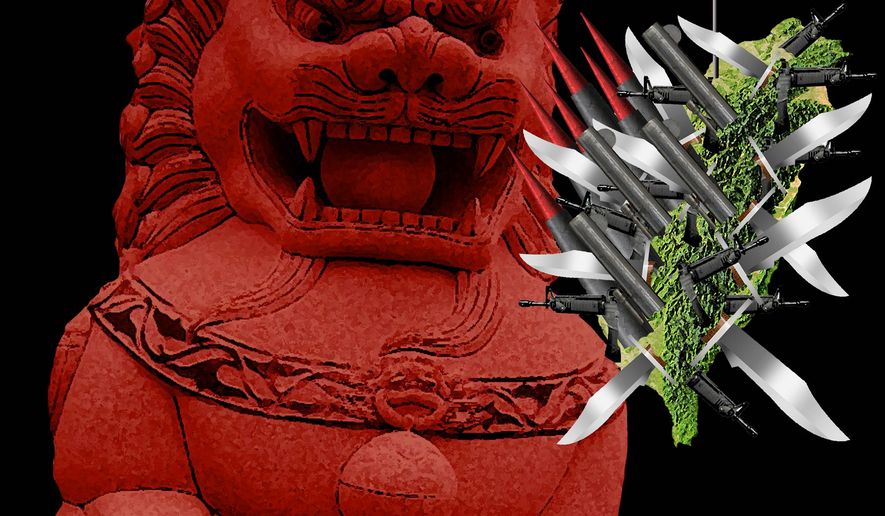OPINION:
Even if not by design, President Trump made a clear demonstration of American resolve by striking Syria as Chinese President Xi Jinping arrived for his April 6 meeting at Mar-a-Lago. Mr. Trump can further demonstrate U.S. resolve by moving quickly to strengthen the defense of Taiwan, a strategy that has successfully prevented war on the Taiwan Strait for more than 65 years.
A free Taiwan has been an essential requirement for America’s strategy of promoting defense cooperation and alliances among Asia’s democracies in order to deter war in Asia. In June 1950, when China and Soviet-assisted North Korea attacked South Korea, President Harry Truman ordered the 7th Fleet to deter a Chinese attack against Taiwan, preventing the Korean conflict from becoming a wider war involving Soviet and more U.S. forces. Today, Taiwan’s geostrategic position protects Japan, makes more difficult any attack against the Philippines and puts a brake on China’s growing global military ambitions.
Taiwan’s evolution into a thriving market democracy over the last 25 years both affirms U.S. strategy and stands as an example to the Chinese Communist Party (CCP) dictatorship and China’s people that political freedoms strengthen economic freedoms. Allowing both would require the CCP to relinquish power for the benefit of the Chinese people. Unwilling to do so, it instead hypes external threats and prepares to invade Taiwan.
It is possible that by the early 2020s, China will have the combination of capabilities required to invade Taiwan for the first time since the 1950s, including access to thousands of civil transport ships, and the missiles, aircraft and cyber assets to secure air superiority. If it succeeds, China will likely threaten Japan’s Ryukyu Island Chain, which includes the crucial military bases on Okinawa, and move to impose greater military control over the South China Sea. By crushing Taiwan’s democracy, the CCP hopes to break the U.S.-led alliance system in Asia and prove that liberal democracy is on the global decline.
One outcome of the Trump-Xi meeting is that they will continue to talk about how to end North Korea’s nuclear missile threats. China can be expected to try to link any help to U.S. concessions on its support for Taiwan. This should be rejected without argument as China is largely responsible for North Korea’s nuclear missile threat, and is likely ready to use a North Korean nuclear crisis to divert U.S. attention from military action against Taiwan.
Instead, the Trump administration should double down on the strategy that has worked: deterring a Chinese invasion of Taiwan by ensuring that Taiwan has the military means to defeat such an invasion. Since the 1950s, Washington has sold successive generations of military technology to Taiwan which, until recently, gave it a local superiority that deterred China.
But due to its massive military buildup since the 1989 Tiananmen Massacre, by the early 2020s China’s 1,500 missiles presently aimed at Taiwan could grow to many thousands and it could have 3 to 4 times the number of fourth-generation combat aircraft than Taiwan. By the 2030s, China’s military threats will include combinations of directed-energy weapons, and advanced cyber, information and space combat systems.
America’s challenge on the Taiwan Strait is not to simply allow for upgrades in Taiwan’s existing forces, such as the Obama administration’s 2011 decision to sell upgrades for Taipei’s fourth-generation F-16 fighters, but also to enable Taiwan to defeat China’s invasion threat of the 2020s and more advanced threats of the 2030s.
Taiwan requires “asymmetric” capabilities such as small, cheap but highly accurate cruise missiles it can manufacture in the thousands to defeat Chinese invasion forces. Taiwan also requires technologies necessary to fulfill plans to make indigenous submarines and an inexpensive next-generation fighter. A small number of short take-off, more survivable F-35B fighters should be sold to Taipei to serve as mobile long-range sensor and electronic warfare platforms.
Taipei also requires new directed-energy weapons that will allow it to defeat Chinese missiles and strike aircraft at far less cost than anti-missile and anti-aircraft missiles. Taiwan’s increasingly sophisticated military technology sector may prove to be a valuable partner in accelerating U.S. energy weapons developments. Washington should consider new space launch cooperation with Taiwan as part of a broader effort to enable its allies to help prevent China’s military domination of Low Earth Orbit. Taiwan should also be invited to observe and participate in the U.S.-led RIMPAC exercises.
Before the April Trump-Xi meeting, there were encouraging reports the administration is considering a new arms sales package for Taiwan, larger than the one the Obama administration was planning to release, but withheld following Mr. Trump’s December phone call with Taiwan President Tsai Ing Wen. The administration may also be considering the sale of F-35 fighters to Taiwan.
Washington should proceed quickly to realize such plans. It is a secure Taiwan that will prevent war on the Taiwan Strait, not any concession on that support for dubious Chinese promises to resolve disputes over North Korea or trade. It is China that poses the growing military threat to democratic Taiwan, to Japan and to South Korea by its economic and military support for Pyongyang. To sustain its alliances and leadership in Asia, it is imperative that America demonstrate its resolve by continuing to help defend the security of Taiwan’s democracy.
• James A. Lyons, a retired Navy admiral, is former commander of the U.S. Pacific Fleet, and Richard D. Fisher Jr. is a senior fellow with the International Assessment and Strategy Center.




Please read our comment policy before commenting.